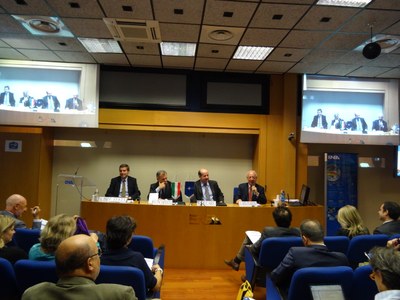ENEA and NATO to share knowledge for peace and security
5/11/2015
 The NATO Science for Peace and Security Programme was presented to Italian researchers on October 21, during an Information Day held at ENEA’s headquarters, in Rome. The Programme provides funding and support to research projects aimed at developing new technology, new systems and advanced solutions to address security challenges. It is a tool to promote cooperation and dialogue, based on scientific research and knowledge exchange.
The NATO Science for Peace and Security Programme was presented to Italian researchers on October 21, during an Information Day held at ENEA’s headquarters, in Rome. The Programme provides funding and support to research projects aimed at developing new technology, new systems and advanced solutions to address security challenges. It is a tool to promote cooperation and dialogue, based on scientific research and knowledge exchange.
The cooperation between ENEA and NATO has actually already produced remarkable results, such as those of the STANDEX, Stand-off detection of Explosives, programme. Officially launched in the framework of the NATO-Russia Council in February 2010, the STANDEX programme was designed and developed jointly by a consortium of Dutch, French, German, Italian and Russian laboratories and companies. STANDEX produced a set of innovative technologies to detect explosives remotely in crowded public places, such as underground or railway stations, in real time, without disrupting the flow of passengers.
Then there is the BEARER project, to investigate the characteristics of a panel of biomarkers as novel tools for early detection of radiation, which has just been launched.
“ENEA’s activities and NATO SPS key priorities reveal that there is a common ground for great cooperation between the two institutions, both are oriented to foster research, innovation, and knowledge exchange... ENEA in its recent reorganization has renewed its commitment to support security issues with an internal strategy to integrate different sectors of research, such as the development of systems and sensors, the protection of critical infrastructures, robotics, subsea systems and local energy production” pointed out Federico Testa, ENEA Commissioner, in his welcome speech.
“Once people were against or in favour of NATO, today, I would say, people do not know NATO. They do not know what NATO is doing for peace and security; that is why the SPS Programme is so important”, remarked Ambassador Alessandro Minuto-Rizzo, President of NATO Defence College Foundation.
The SPS Programme includes various grant mechanism. Activities can take the form of multi-year project, workshops or training courses. Industry, researchers, academics and government experts can apply for funding and support: it is NATO largest civil partnership tool.
For more information
Antonio Palucci, ENEA, member of the SPS Programme Independent Scientific Evaluation Group, antonio.palucci@enea.it
